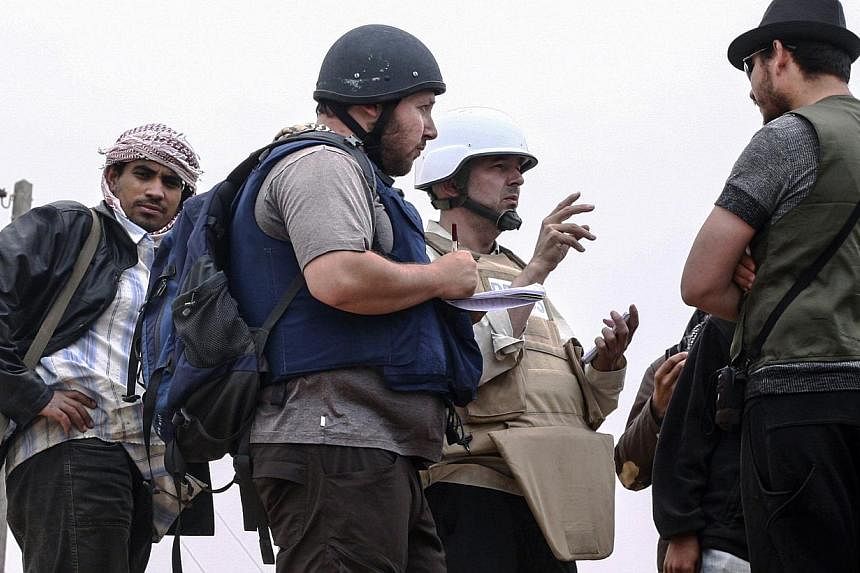Steven Sotloff once described the war zone as a "scary, dangerous" place but he kept going back nevertheless.
This was how much the American freelance journalist loved his job and how determined he was to report from the field, despite the potential risks.
Sotloff, 31, was shown in a video released on Sep 2 by the militant group Islamic State in Iraq and Syria (ISIS), apparently beheaded, a year after he was abducted in northern Syria.
He was the second journalist to be killed by the group, also known as Islamic State, in two weeks following the release of a video on Aug 19 that showed the beheading of fellow US journalist James Foley.
Well-versed in the history and culture of the Middle East, the Arabic-speaking Sotloff wrote for Time, the Christian Science Monitor, Foreign Policy and World Affairs Journal.
He had reported from countries including Egypt, Libya and Syria.
"Steven embodies what it takes to report from combat zones," said Bill Roggio, managing editor of the Long War Journal, a news website for which Sotloff wrote in 2011 from Cairo, according to AFP.
"He has that courage and little bit of craziness that you need to take risks to observe and understand a story in dangerous places."
Describing himself as a "stand-up philosopher from Miami", Sotloff's articles often focused on the human side of the conflict, BBC said.
World Affairs Journal described him as "an honest and thoughtful journalist who strives to understand the story from local perspectives".
According to CNN, Ashley Burns, who edited some of Sotloff's work, said: "He writes with incredible passion, about Benghazi and his experiences in Syria and Turkey, while showing an incredible relationship with - and understanding of - the people that he met in the countries that he has worked in. His courage is incredible."
Writer Ann Marlowe, who met Sotloff in Libya, tweeted: "Steve Sotloff lived in Yemen for years, spoke good Arabic, deeply loved Islamic world."
"He struck me as a very, very decent guy ... he wasn't chasing headlines, he wasn't hyping a pitch," said James Denton, publisher and editor of the Washington-based journal World Affairs that hired Sotloff for freelance work, Reuters reported.
"He wanted to get the story, he wanted to peel away the layers," said Denton.
When he was in Libya in 2012, Sotloff reported on the aftermath of the attack on the US consulate in Benghazi.
He argued that any US action following the attack should be done carefully, telling Fox News: "The Libyans are very grateful to the Americans for what they did last year during the revolution... it's really important it stays that way because Libya can be a very strong ally in the future."
In early 2013, he wrote about the plight of displaced civilians in Syria struggling without adequate food or shelter.
"I've been here over a week and no one wants freelance because of the kidnappings. It's pretty bad here," he wrote in an e-mailed to another journalist. "I've been sleeping at a front, hiding from tanks the past few nights, drinking rain water."
In August 2013, telling colleagues he understood the dangers, Sotloff returned to Syria, slipping across the border from Turkey. This was when he was kidnapped and fell into the hands of ISIS.
"He is a journalist who made a journey to cover the story of Muslims suffering at the hands of tyrants," Sotloff's mother, Shirley said in a last ditch appeal for mercy a week before his killing.
"I ask your justice to be merciful and not punish my son for matters he has no control over," the desperate mother said in the direct appeal to Abu Bakr al-Baghdadi, Islamic State's self-proclaimed caliph.
Sotloff grew up in South Florida with his mother, father and younger sister, CNN reported.
He attended high school at a New England boarding school, Kimball Union in New Hampshire.
He revitalised the school's newspaper and received a journalism award upon graduation, the school said in a statement on Sep 2.
It described him as "an active and involved student whose interest in journalism was evident early on."
An avid basketball fan and supporter of the Miami Heat, he tweeted in June 2013: "Is it bad that I want to focus on #syria, but all I can think of is a #HEATFinals repeat?"
Emerson Lotzia, who met Sotloff when they were both starting college in 2002, described Sotloff as "someone you want in your circle of friends - just a good, good guy."


